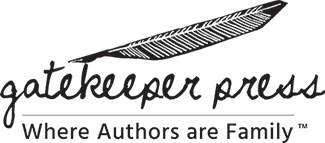 Tell us a little bit about yourself, your books and any new projects you are working on.
Tell us a little bit about yourself, your books and any new projects you are working on.
1. When did you first know you wanted to be a writer?
I was a journalist through college, and a lawyer after that, so in one way, I’ve been writing my whole life.
But when it came to writing fiction books, followed by non-fiction, I started late in life — forty-one years old. All of a sudden I had a story I needed to write (and that I thought needed to be told), so I just started writing it.
2. How long have you been writing? How many books have you written?
I’ve been writing ever since that first book I started writing in 2012, which I finished in 2016. My seventh book will be released in the fall.
3. What made you want to self-publish?
I started out as an outsider to the writing world, with no idea how to take my finished product and get it out into the world. Gatekeeper offered an easy and affordable way to do that, and it’s been a great fit for several of my books.
Publishing through Gatekeeper now makes a lot of sense for me because I write non-fiction addressing current events. The traditional publishing process takes far too long to stay ahead of the fast-moving news cycle that we’re in. Gatekeeper has allowed me to get books out quickly, while their content is still fresh.
I also like having control over the price.
4. Would you recommend new authors self-publish, and would you recommend Gatekeeper Press?
It really depends on the circumstances. I’ve had traditional publishers buy several of my novels, and those worked out well also. But if you do decide to self-publish, I can’t recommend Gatekeeper highly enough.
5. What do you do marketing-wise to help announce and sell your books?
I’m very active on social media as well as an email list I’ve built up over the years. I now have a Substack newsletter where I write regularly to a decent audience. And around launch time, I hire a freelance PR team that has been very effective at getting my books press.
6. What advice do you have for a new or fledgling author?
Find time to write every day.
Get as much feedback as possible—don’t let harsh critiques stop you, but definitely listen to them.
When you get the book out there, know that you’ll spend as much time (or more) marketing the book than you did writing it.
7. What social media platforms are you on?
Twitter, Substack, Facebook, Instagram, Tik Tok, YouTube, Spottable
8. What is the one piece of advice you wish you had known when you first started out?
The traditional agent/big publisher process seems pretty much unworkable if you’re an outsider to the writing world. But in the end, the most important accomplishment in writing your book is that you wrote the story you wanted to. If it takes off, even better. But just writing your story is the big win.
9. What do you feel is the biggest challenge authors are facing going into 2023 (and beyond)?
It’s a really competitive world, especially when it comes to generating fiction that sticks out and grabs a big audience. At the same time, social media offers many more opportunities to get your work out there than in the past.
10. Have you won any awards or contests that you would like to mention?
After being rejected by one agent after the next for months on end, I used Gatekeeper Press to publish my first book in 2016. It was called The People’s House. While not quite an award, in November of 2016 the Wall Street Journal wrote a glowing review, and named it the “sleeper” for political thriller of the year. And it later was touted as “the thriller that predicted the Russia scandal” in Politico Magazine.
Please share your website/social media links below:
Twitter: @davidpepper
YouTube: @davidpepper4ohio
